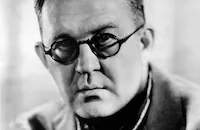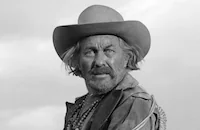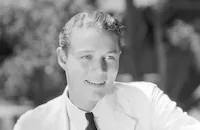The Horse Soldiers

Brief Synopsis
Cast & Crew
John Ford
John Wayne
William Holden
Constance Towers
Judson Pratt
Hoot Gibson
Film Details
Technical Specs

Synopsis
In the spring of 1863, on board a boat on the Mississippi River, Union Army Col. John Marlowe of Illinois meets Gen. Ulysses S. Grant, head of the Union forces. Frustrated by the North's long inability to break through to the critical Southern stronghold of Vicksburg, Mississippi, Grant orders Marlowe to form a cavalry brigade and wreak havoc on Confederate supply lines within Mississippi. Marlowe presents a plan to attack the main supply depot, Newton Station, over three hundred miles behind enemy lines and wins Grant's approval. Later while briefing his officers, Marlowe is annoyed to find that surgeon Maj. Henry Kendall has been assigned to the brigade. Perplexed by Marlowe's unexpected hostility, Kendall asks what would become of the wounded with no aid and the colonel brusquely declares they would be left behind. Soon after, the brigade sets out and after a day's ride is well behind Confederate lines. When Marlowe's scouts are spotted and fired upon by a small band of Confederates, Marlowe decides to send back one unit in hopes of convincing the enemy that the entire brigade has fled. While Marlowe regroups with Maj. William Secord, of Michigan, Kendall is summoned to a nearby shack where he delivers the baby of a former slave. Angered by Kendall's action, Marlowe places him under officer's arrest and insists that the doctor's duty is to the army alone. That afternoon, the cavalry arrives at Greenbriar Landing, home of Hannah Hunter, who lives alone with her black maid Lukey. Lukey is surprised when the patriotic Hannah greets Marlowe and his men effusively and invites the officers for dinner. That evening after dining, Marlowe requests use of the room for an officer's meeting, but Hannah insists they use the study instead. Marlowe dismisses Kendall from the meeting and the doctor, suspicious of Hannah's ingratiating manner, insists on accompanying her to her room where he discovers the conversation in the study can be clearly heard through the open fireplace grate. Kendall turns the women over to Marlowe, who is shocked when Hannah reveals her contempt and disdain for the Union soldiers. As Hannah and Lukey have overheard Marlowe's plans to attack Newton Station and then boldly continue through Mississippi to Baton Rouge, Louisiana, the colonel is forced the bring the women with them when they depart the next day. On the ride, Hannah rebuffs Kendall's attempt to befriend her and breaks away from the line in a desperate attempt to escape. After she is recaptured while forging the river, Marlowe demands that she promise not to attempt another escape. As the cavalry continues their journey, scouts report an enemy militia nearby and Marlowe orders a retreat into the forest. As the Confederate troops ride by, Hannah darts to the edge of the woods to get their attention but is tackled by Kendall, then knocked out by a furious Marlowe. Upon reviving, Hannah complains about her mistreatment, but grudgingly agrees not to try to signal the Confederate forces again. Later that afternoon, the Union scouts come under fire from two AWOL Confederate soldiers, who upon surrendering, reveal that the main Confederate Army has turned away from Newton Station toward Vicksburg. Marlowe pushes his men on to Newton Station where the advance led by Maj. Gray has rounded up the few remaining enemy troops guarding the town. Among the prisoners, Kendall finds longtime friend Jonathan Miles, who has lost his arm in battle as a colonel in the Confederate Army. Marlowe hopes to burn the supply depot and tracks without conflict, but when a supply train approaches the station, he notices there is no guard on it and realizes an attack is imminent. As the train pulls to a halt, Confederate soldiers pour from the cars and Miles overcomes his guard and frees the other Southern prisoners who join the attack. Marlowe rages against the ensuing brutal fight, climaxed by the one-armed Miles hoisting the Confederate flag and leading a charge. Kendall knocks Miles down to save him from being killed and later tends to his friend's wounds at the hotel that is used as a hospital. After the fighting ends, Marlowe is surprised to find Hannah and Lukey helping Kendall and soldier "Hoppy" Hopkins. Frustrated by the high casualties, Marlowe drinks heavily at the hotel bar and as his men blow up the depot, bitterly remarks to Secord that before the war he built railroads. When Hannah expresses puzzlement over Marlowe's venomous attack on the exhausted Kendall, Marlowe confesses that the ineptitude of doctors killed his wife years earlier. After completely destroying the surrounding railroads, Marlowe and his troops depart south while Hoppy accompanies the wounded north. While passing through a small town, Confederate scouts fire upon Marlowe's troops and, to Hannah's despair, Lukey is killed. Several of the men offer Hannah their sympathy and Marlowe offers to let her go, but she admits it is too late to stop them. Continuing south, Marlowe's scouts report a Confederate unit across the river and Marlowe decides to attack the following morning. Unknown to the Union troops, a Confederate messenger has sought assistance from a nearby military institute, pleading for the young cadets to help distract the enemy until reinforcements arrive. The next morning, Marlowe is outraged to discover that a soldier has died during an amputation operation and when he admonishes Kendall, the irate doctor challenges him to a fight. The men's fistfight is interrupted by a surprise assault by the Confederate unit. Both forces are then amazed by the arrival of the school cadets in their full dress uniforms, who take up an orderly position and fire upon Marlowe's men. Refusing to attack the cadets, Marlowe calls a pullback, leaving the enthusiastic cadets to believe they have routed the enemy. Marlowe's troops circle around the river and, upon receiving word that a larger enemy force is trailing them, press on southward, seeking refuge in a swamp to avoid conflict. Arriving at a crucial bridge crossing, Marlowe tells Hannah that as the Confederates are just an hour behind them, he will leave her there. As the troops prepare to cross the river, however, a Confederate squad opens fire on them and Marlowe is shot in the ankle. Hannah assists Kendall in tending to Marlowe, who then leads his men in a fierce attack against the enemy. After dispersing the enemy, the Union troops mine the bridge, then cross into Louisiana. Kendall surprises Marlowe by requesting to remain behind with the numerous wounded, despite the likelihood that he will be captured and sent to the notorious Andersonville prison. Marlowe bids a guardedly respectful farewell to the doctor, then as he says goodbye to Hannah, admits he has fallen in love with her. Marlowe then lights the bomb fuse and dashes across the bridge, which explodes just as the Confederates arrive.

Director

John Ford
Cast

John Wayne

William Holden

Constance Towers

Judson Pratt

Hoot Gibson

Ken Curtis

Willis Bouchey
Bing Russell
O. Z. Whitehead
Hank Worden
Chuck Hayward
Denver Pyle

Strother Martin
Basil Ruysdael
Carleton Young

William Leslie

William Henry

Walter Reed

Anna Lee
William Forrest
Ron Hagerthy
Russell Simpson
Althea Gibson
Stan Jones
Richard Cutting
Jan Stine

Bill Wellman Jr.
Crew
Frank Beetson
David Buttolph
William Clothier
Dan D. Emmett
Victor Gangelin
Sam Gordon
Ray Gosnell Jr.
Frank Hotaling
Stan Jones
Fred Kennedy
Roy Kennedy
Louis Lambert
Auggie Lohman
Harry Macarthy
John Lee Mahin
John Lee Mahin
Jack Murray
Web Overlander
Ann Peck
Martin Rackin
Martin Rackin
Stanley Scheuer
Fae Smith
Wingate Smith
Jack Solomon
Meta Stern
John Veitch
Allen K. Wood

Videos
Movie Clip



Trailer
Film Details
Technical Specs

Articles
The Horse Soldiers
But despite the battle of bullets that was being recreated for the cameras, it was John Ford's battle with the bottle behind the camera that was far more brutal. A long-time alcoholic, Ford was ordered by his doctor to abstain from drinking or he would surely die from the effects. Even though he was as stubborn a man as they come, Ford obeyed the physician's orders. Still, the absence of drink caused Ford to treat his cast and crew rougher than usual. The one who usually got the worst treatment, drink or no drink, was John Wayne, and he got it good on the set of The Horse Soldiers. Ford even demanded that Wayne also abstain from drink, even though he had no such orders from his physician. Wayne begged producer Martin Rackin to get him away from Ford's omnipresent gaze, if only for a brief moment. Rackin obliged and lied to Ford, telling him that Wayne's teeth were beginning to show up yellow on film and that he needed to take both Wayne and co-star William Holden to New Orleans to have their teeth cleaned. So the drunken trio spent a roaring night in the Crescent City, returning to a furious Ford who knew through his spies exactly how many bars they had visited. Despite the incident, Ford stayed away from drink...that is, until just after the shoot.
It turns out that Ford's friend, Fred Kennedy, a former stuntman, persuaded the director to let him perform a stunt for extra money since he was flat broke. Ford finally relented and allowed Kennedy to perform a fairly standard stunt of falling off a horse. But tragically, Kennedy broke his neck performing the stunt, and was dead on arrival at the nearest hospital. The scene showing Kennedy's fatal fall remains in the finished film. Ford was so grief-stricken by Kennedy's death that he closed down the location site and went back home, eventually finishing the final battle scene in the San Fernando Valley. He then left for Hawaii where he fell hard off the wagon.
In terms of his own career, John Wayne viewed The Horse Soldiers as a film that would allow him to funnel some of the profits into his own pet project, The Alamo (1960), which he was already in the process of casting and producing. At the same time, he was having personal problems at home. His wife, Pilar, had become addicted to barbiturates but Wayne refused to admit her to a private sanitarium. He felt they could conquer her addiction together and brought her along on location for The Horse Soldiers in Louisiana. During the filming, however, Pilar began hallucinating and slashed her wrists with a razor, at which point Wayne realized the seriousness of the situation and had her admitted to a hospital back in Encino. The incident was kept out of the papers and the public never suspected that the most popular box office star in America, which the Duke was at the time, was experiencing a personal crisis at home.
Director: John Ford
Producer: John Lee Mahin (uncredited), Martin Rackin (uncredited)
Screenplay: Harold Sinclair (story), John Lee Mahin, Martin Rackin
Cinematography: William Clothier
Editor: Jack Murray
Art Direction: Frank Hotaling
Music: David Buttolph, Stan Jones
Cast: John Wayne (Colonel John Marlowe), William Holden (Major Henry 'Hank' Kendall), Constance Towers (Hannah Hunter), Judson Pratt (Sergeant Major Kirby), Hoot Gibson (Sergeant Brown).
C-120m. Letterboxed. Closed captioning.
by Scott McGee

The Horse Soldiers
Quotes
Look here, colonel, I didn't ask to be assigned to this mission...- Major Kendall
Kirby, you tangle with me, I'll have your hide.- Col. John Marlowe
You're welcome to that too sir, if it's in the line of duty.- Sgt. Maj. Kirby
Now come off it Colonel, even you were born.- Major Kendall
They'll catch up to you and cut you to pieces, you nameless, fatherless scum.- Miss Hannah Hunter
I suggest you see a doctor.- Major Kendall
Trivia
'John Ford' suspended location filming in Louisiana after Fred Kennedy was killed performing a riding stunt. Film was later completed in California.
Notes
The Hollywood Reporter review mistakenly lists the film's running time as 159 minutes. In June 1958, just prior to the start of production of The Horse Soldiers, Paramount Studios filed an injunction against William Holden in an attempt to prevent the actor, under contract to the studio, from appearing in the Mirisch Company production, United Artists release. On October 13, 1958, a district court denied Paramount's request, clearing the way for Holden to appear in the film, which was shot on location in Louisiana and Mississippi, as well as at the Samuel Goldwyn Studios.
The Horse Soldiers marked the only feature film acting role of tennis star Althea Gibson (1927-2003). Gibson became the first African-American woman to win singles championship titles at the French Open (1956), Wimbledon (1957, 1958) and the United States Open (1957, 1958). According to a biography on director John Ford, because of racial segregation laws in Louisiana, Gibson would have been forced to stay in separate housing during the shoot, so all her scenes were shot in Hollywood, with doubles used in long shots filmed on location. Songwriter Stan Jones (writer of the film's theme song, "I Left My Love") appeared in a small uncredited role as Gen. U. S. Grant. Jones had appeared in several Ford films in minor roles throughout the 1950s. Hollywood Reporter news items add Buff Brady, Mike Steen, Jerome Loden, Phil Kieffer, Fred Graham and Dan Borzage to the cast, but their appearance in the finished film has not been confirmed.
In early December 1958, near the end of the shoot in Natchitoches, LA, longtime stunt rider Fred Kennedy executed a fall from a horse improperly, broke his neck and died. According to fellow stuntmen, Kennedy had broken his neck two years earlier, but it had healed. Kennedy had appeared in several films directed by Ford and the director was greatly affected by Kennedy's death. According to Ford biographies, after the incident he halted filming and immediately moved the production back to Hollywood. Although some modern sources suggest that Ford was so affected by Kennedy's death that he did not complete the climactic battle of the film as scripted, a biography notes that the battle and destruction of the bridge was filmed as written.
A tag closing of "Marlowe" and his troops riding into Baton Rouge was dropped, but a biography on Ford states that the director never intended to shoot it, as it too closely mirrored the end of M-G-M's 1949 production Battleground with the old, exhausted troops marching in as new, fresh troops march out (see AFI Catalog of Feature Films, 1941-50). The December 1958 Variety article chronicling Kennedy's death also noted that three others involved with the film suffered broken legs during the production. A modern source indicates that one of those was Ford's son, Patrick, who also served as a location scout.
Modern sources reveal that Mahin and Rackin initially wanted to cast Clark Gable in the role of Marlowe. The same sources state that Jack Pennick trained the 150 cadets from Jefferson Military College, who appeared in the sequence of the Confederate boy soldiers, based on real events.
The film and novel The Horse Soldiers were loosely based on an historical event during the Civil War. A former Illinois music teacher, Union colonel Benjamin H. Grierson, was ordered to take 1,700 men on a cavalry raid from the Tennessee border through Mississippi to destroy railroad supply lines, bridges and commissaries between 17 April and May 2, 1863. Grierson's disruption of Confederate supplies and successful maneuvers against their forces allowed Gen. Grant and his army to reach the Mississippi River. Soon thereafter, Grant's men took Vicksburg, a climactic turning point for the Northern forces.

Miscellaneous Notes
Released in United States Summer June 26, 1959
John Wayne and William Holden were each paid $750,000 plus twenty percent of the profits for their services, and John Ford got $200,000 plus ten percent of the profits for his directorial effort.
Released in United States Summer June 26, 1959














